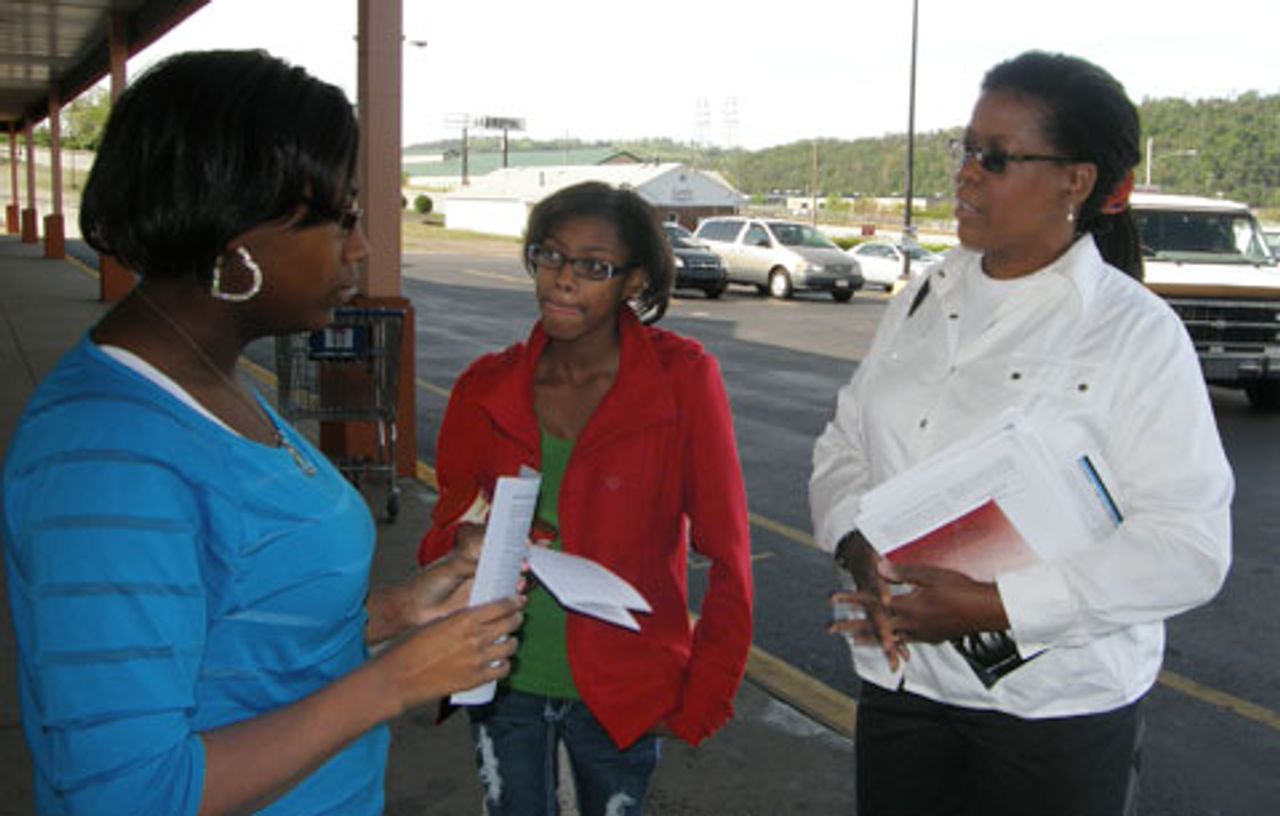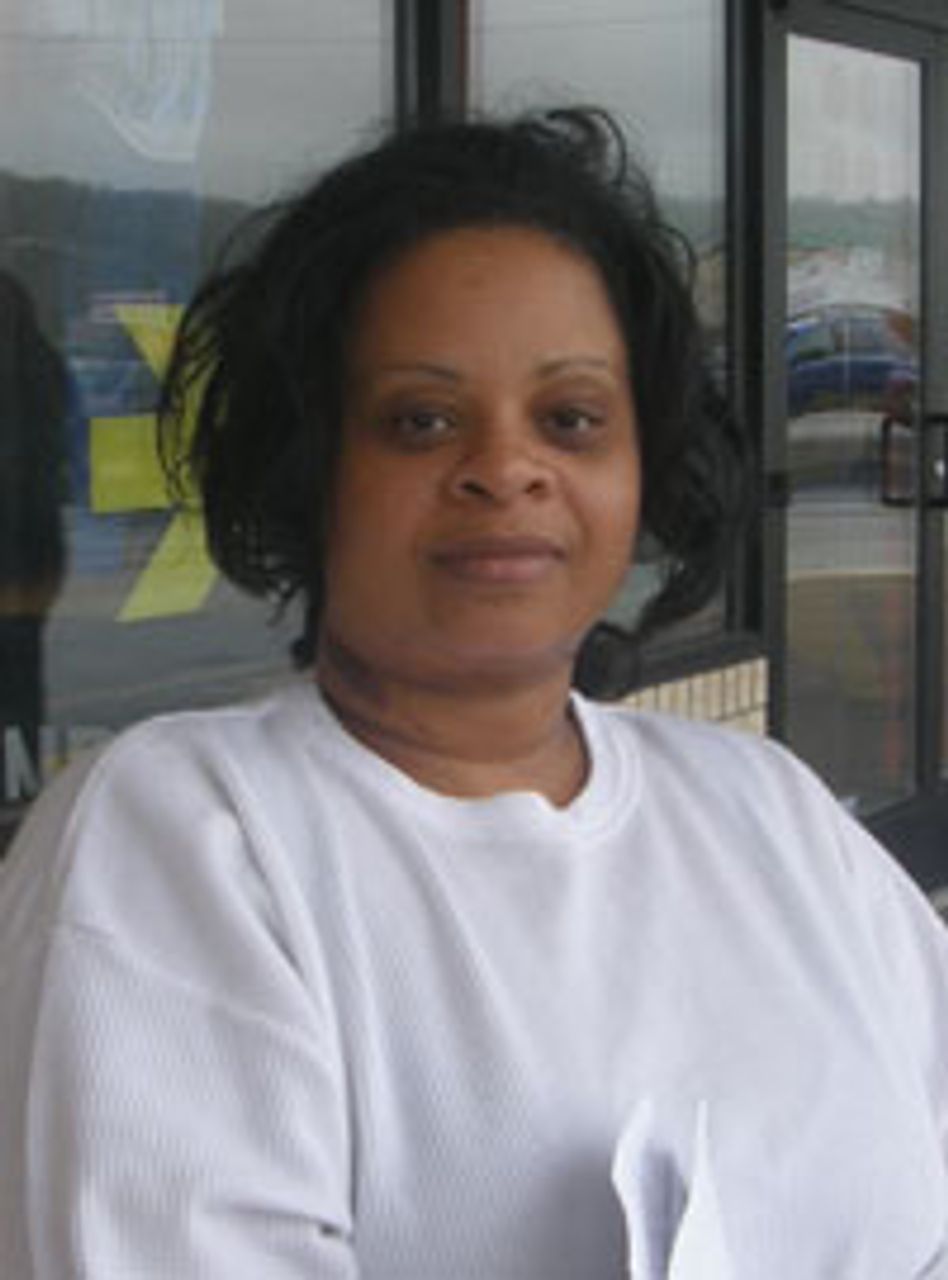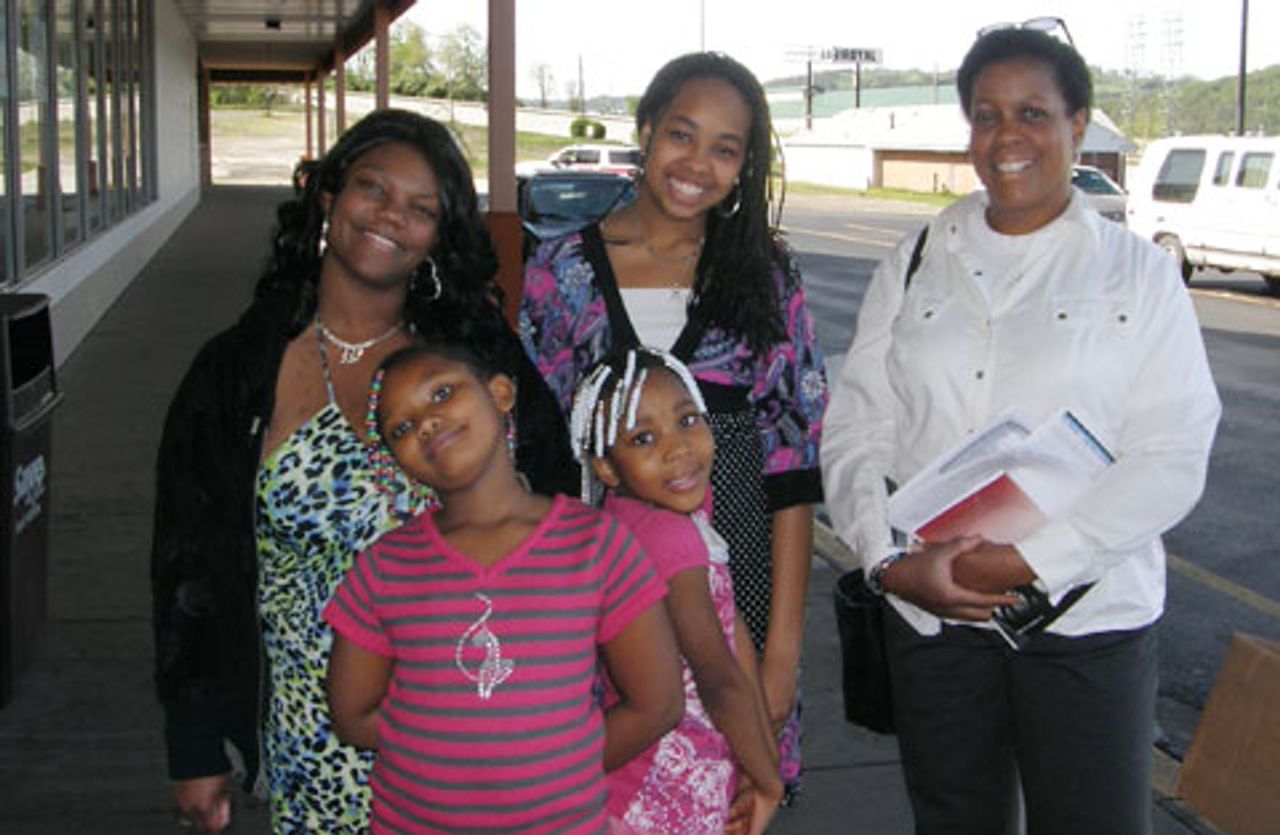 Phyllis Scherrer speaking with High School Students Teona and Tiara Robinson
Phyllis Scherrer speaking with High School Students Teona and Tiara RobinsonSocialist Equality Party supporters and SEP vice presidential candidate Phyllis Scherrer campaigned in the former steel town of Duquesne, Pennsylvania over the weekend. Located about 12 miles south of Pittsburgh along the Monongahela River, the town used to be home of one of the largest steelworks in the country, US Steel’s Duquesne Works.
At its peak the town had more that 22,000 residents and the mill employed nearly 8,000 workers. The Duquesne works had six blast furnaces, including “Dorothy Six,” which produced the largest amount of steel in the world. In addition there were two open-hearth furnaces and 12 rolling mills that turned the steel into finished products.
The mill was closed in the mid 1980s. Today, the town has fewer than 6,000 people, with high rates of poverty and unemployment. The campaigners won strong support from workers and young people in the area, with many people especially concerned about destruction of public education.
Last month the state board that has been running the Duquesne School District for several years, announced it was ending 7th and 8th grade classes this year and sending those students to neighboring school districts. In 2007, the school board did the same thing with the high school students.
 Donavon Dumas and Lamar Johnson
Donavon Dumas and Lamar JohnsonLamar Johnson and Donavon Dumas described the conditions for young workers in the city. “They don’t have money to save the school, but they can build office buildings in Pittsburgh and tunnels under the river,” Donavan said, referring to an over $600 million project to extend a subway to Pittsburgh’s north side.
Pointing to the chronic lack of resources for young people in the city, Lamar added, “There are no libraries, no recreation centers, youth centers or even a YMCA. Kids have nothing to do and end up getting into trouble.”
A member of the Socialist Equality Party pointed out that Obama administration had given billions to bail out the banks but when it comes to social programs both parties say there is no money.
Donavon explained that there are no decent-paying jobs in the area. “I work two days a week for four hours a day at $7.25 an hour. What can you do with that? I can’t live myself, yet there are always friends who are asking me to borrow money.
“If you are rich, in the high ranks, you get bankrolled. But if you look below that, at the working people, you see we are being left with nothing.”
 Arlene White
Arlene WhiteArlene White, a nurse at a nursing home in nearby McKeesport, expressed her outrage over the decision to move the kids to other schools. “It is not good for our kids. Parents are having a hard enough time keeping kids in school.
“I feel it is the government’s responsibility to ensure that all children get a good education. It is a requirement for our children to be able to get a decent job and in turn make a contribution to society,” Ms. White said.
The Duquesne Schools have been faced with crisis ever since the closure of the steel works and the massive loss of tax revenue. Within a year of the closure of the steel mill, Democratic county officials arranged that the site be taken over by the county, which relieved US Steel of any obligation to pay taxes on the property.
Almost overnight, Duquesne School district lost half of its tax revenue. In addition, with no jobs, housing values plummeted and thousands of people moved out of the area looking for work.
The school district responded by closing all the schools except for the high school and combining all the grades into the one building. “It was alright for the younger grades,” said Tiara Robinson, who was in third grade at the time. She, along with her sister Teona, are now in 9th grade and have been placed in one of the for-profit charter schools that have exploded around Pennsylvania.
“We had a floor to ourselves, but the other grades were all jammed together and nobody could learn. Our class was moved into the high school area for a while because they were working in our room and it was total confusion.”
Teona added, “everyone needs a good education, that is the ground work for everything you need to do.” Both Teona and Tiara plan to go onto college.
Phyllis Scherrer explained that the expansion of charter schools and privatization were aimed at undermining the basic principle of public education: that every child, regardless of family income, had the right to quality schooling. Instead, she said, trillions of dollars were needed to greatly improve and expand public education and for a massive public workers program to hire the unemployed to rebuild the cities and the country’s infrastructure. This required the fight for a socialist alternative to the two big business parties, she said.
 Rana Felton with three of her daughters Tytiona 13, Ranaya 8 and Chada 7 and Phyllis Scherrer
Rana Felton with three of her daughters Tytiona 13, Ranaya 8 and Chada 7 and Phyllis ScherrerRana Felton, a mother of five explained she is sending all but one of her children to the charter schools. “I don’t like it. I am concerned about our children’s education and their safety. There is so much money but they don’t care about the working class.”
In addition to the long decline of the steel industry, Duquesne Schools have also faced cuts from both the state and federal government.
 Phyllis Scherrer speaking with John Murphy
Phyllis Scherrer speaking with John MurphyPhyllis spoke with John Murphy, a health care administrator, who said, “I don’t agree with them closing the school and dispersing the kids all over the place. Having a school in a town or a community adds something special to it.”
Murphy used to work for Allegheny Health Systems and complained about the monopolization of health care in the Pittsburgh area by the University of Pittsburgh Medical Center. “Why does a bariatric procedure cost $30,000 here while the same procedure cost just $10,000 in South America?”
Scherrer explained that the SEP opposed Obama’s health care plan because it is designed to make health insurers wealthy while penalizing those too poor to afford coverage. Scherrer explained the SEP was for universal health care by taking the profits out of the health care industry.
Mr. Murphy said insurance companies look at averages for hospital stay, using two patients with appendicitis as examples of a two and a half day stay. “There will always be the patients with complications who should have been allowed to stay longer but wasn’t. They end up returning for more care anyway. That only benefits the insurers.”
Scherrer explained that the entire health care industry needed to be placed under workers’ control and run so that everyone could have health care, instead of being run to make millions for the insurance, drug and hospital companies.
The majority of those Scherrer spoke with were too young to remember when the mills were running. Marvin Kelly, a worker in his 50s, however, used to work on the railroads that serviced the mills. “I worked for the railroad for eight years before getting laid off. There was nothing so I went into the military. Since I came out I have been working just minimum wage jobs. In 19 years I have gone from $4.35 an hour to $7.25. You can’t live on that. I work two jobs and neither one gives me a vacation. One gives me one week’s extra pay each October but no time off.
“My last daughter graduated from Duquesne the year before they closed the high school. There are no jobs here for young people. The politicians don’t care about the poor and the working class. All they care about is the rich.”
